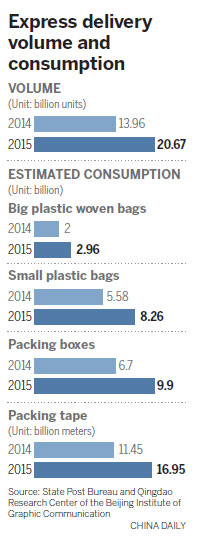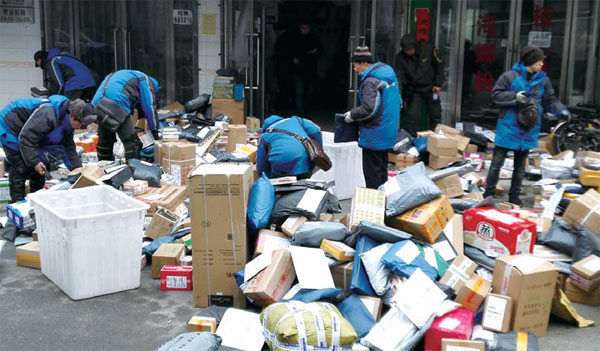Online shopping spells trash trouble

Non-biodegradable plastic bags and other materials used in packaging pose a pollution problem, experts warn
The term "people mountain, people sea" is used by Chinese to describe a place filled with people. But as China's more than 1.3 billion population increasingly shops online, creating a disposal problem for a number of plastic bags and paper boxes, it could be more a case of "garbage mountain, garbage sea". Online retail and delivery services are producing mountains of waste, adding to the country's environmental woes.
China doesn't have a system to regulate the packaging of goods purchased online - which even include such items as freshly cooked soup and congee and frozen seafood.
| Couriers sort out parcels in front of a delivery company in Shenyang, Liaoning province. Provided to China Daily |
Last year, which saw 20.67 billion delivery parcels, the industry left behind 11 billion plastic bags, 9.9 billion cardboard boxes and 17 billion meters of adhesive tape, according to Zhu Lei, deputy director of the Beijing Institute of Graphic Communication's Qingdao Research Center.
He and his staff worked with the State Post Bureau in 2014 to get a thorough picture of the garbage situation from courier services and continued their research last year.
"Most of the plastic bags were not biodegradable and were discarded with other household trash to be piled up, buried or burned, which posed a heavy burden of environmental pollution," Zhu says.

In 2014, the booming service industry generated about 14 billion parcels, the bureau's data showed. If each item of packing material weighed about 200 grams, these parcels would generate 2.8 million metric tons and cover the equivalent of 200,000 football pitches, according to expert estimates.
Chen Jian, who has worked in recycling services for 20 years in Xi'an, Shaanxi province, voices similar concerns over the growing pollution from booming courier services.
Every year, at least 15,000 tons of paper boxes are used in Xi'an, of which only 60 percent are recycled, he told a local newspaper. "Three hundred tons of plastic bags were buried or burned directly at dumping grounds."
The burning or dumping of nonbiodegradable plastic can cause pollution, says Wei Maoquan, head of the Resource Recycling Association in Linyi, Shandong province.
Wei says plastic tape, for example, contains polyvinyl chloride, a chemical than can take at least 100 years to decompose in the soil.
China faces even larger pollution pressures from courier services in the future. Authorities estimate that, by 2020, 50 billion parcels will be delivered annually. However, few delivery services have begun to use easily recyclable or reusable packaging.
Xiang Feng, CEO of Shanghai YTO Express Co, concedes that most plastic materials used now are nonbiodegradable. The company began pilot projects in 2014 to recycle paper and plastic materials, "but we have many difficulties in expanding the recycling system", he says.
Liu Hongbin, vice-president of YHD, another domestic online shopping service provider, says his company began to collect used paper boxes from consumers, if they were in good shape, in 2014. Yet plastic wrapping and stuffing materials are still not on recycling services' lists.
"It would increase the cost for delivery services if they collect the used materials, and the recycled ones would not make a profit for them," says Zhu with the Qingdao Research Center. Nonetheless, he says, it is necessary to improve the recycling system, reduce excessive packaging and promote environmentally friendly packaging materials.
"It's time to facilitate the garbage classification to make sure the dumped plastic bags can be dealt with properly," he adds.
Contact the writers at zhengjinran@chinadaily.com.cn
(China Daily European Weekly 04/15/2016 page15)
Today's Top News
- Takaichi must stop rubbing salt in wounds, retract Taiwan remarks
- Millions vie for civil service jobs
- Chinese landmark trade corridor handles over 5m TEUs
- China holds first national civil service exam since raising eligibility age cap
- Xi's article on CPC self-reform to be published
- Xi stresses improving long-term mechanisms for cyberspace governance































